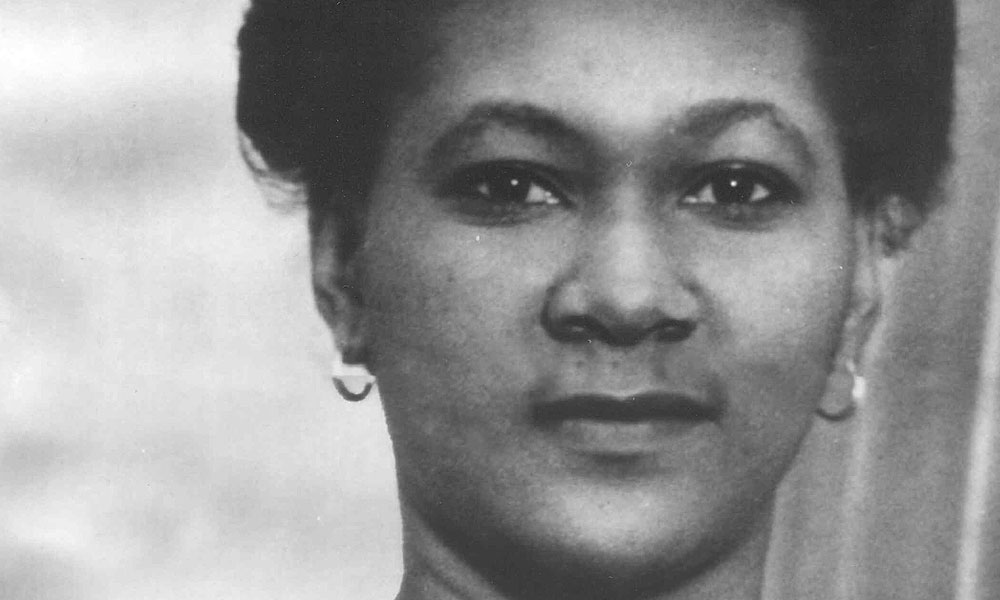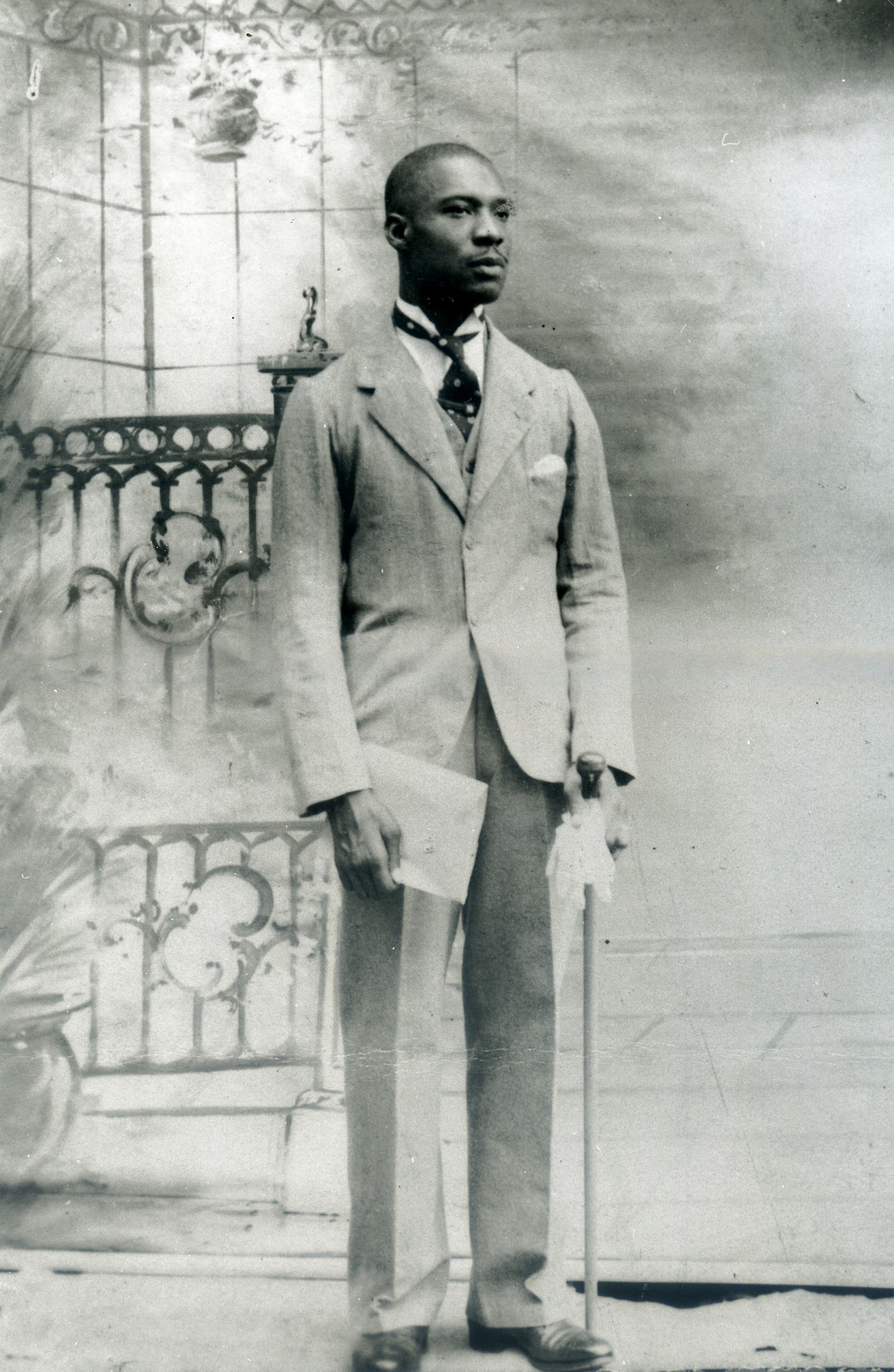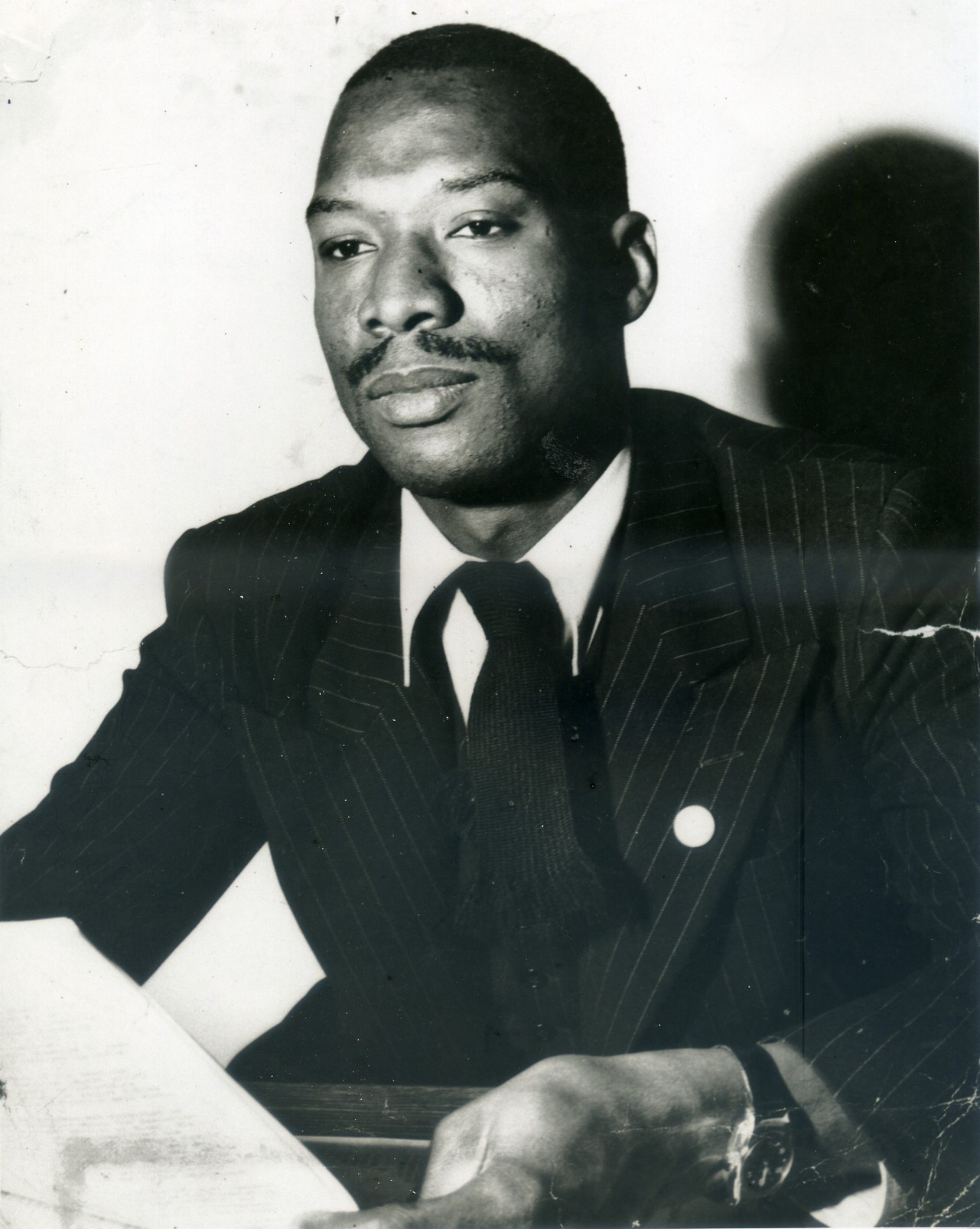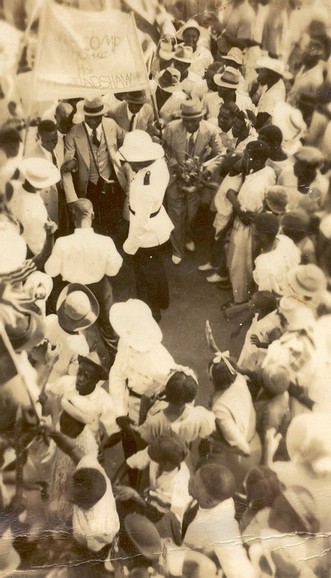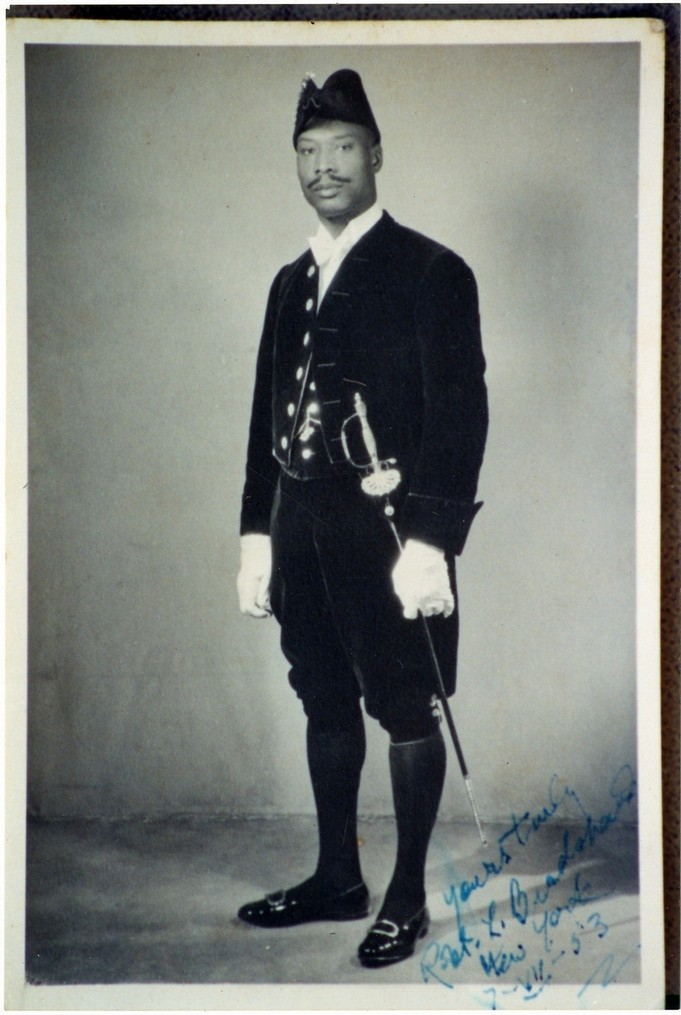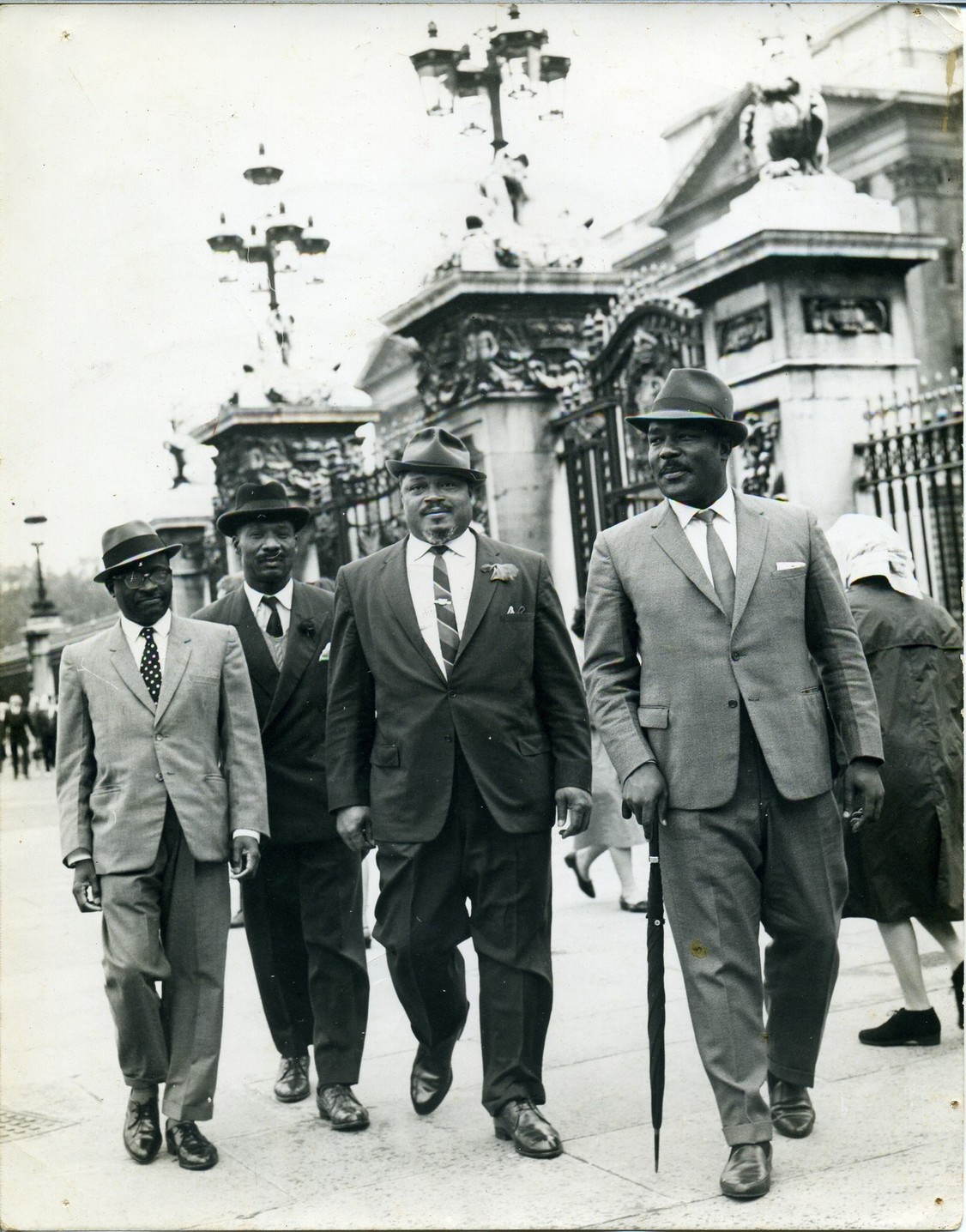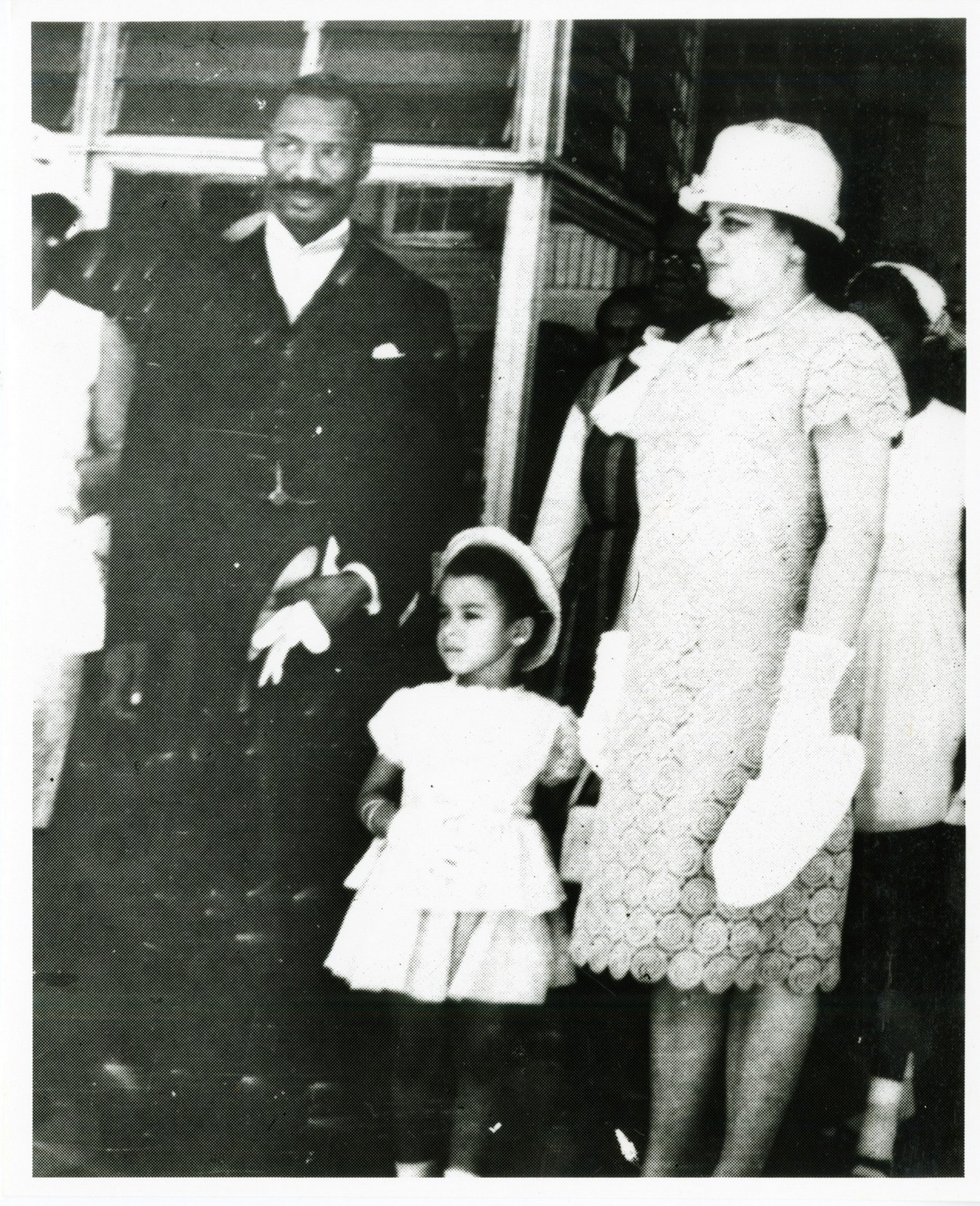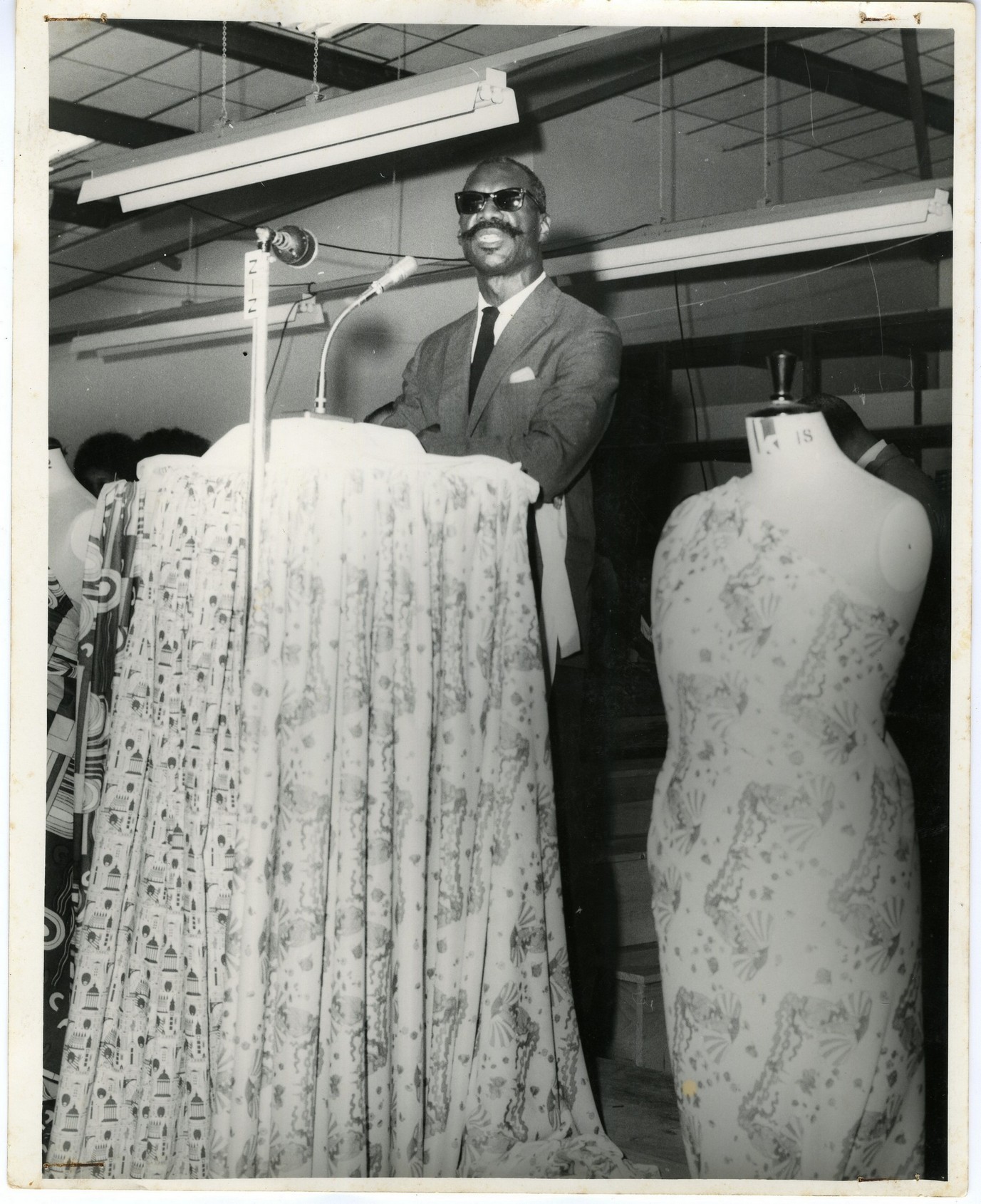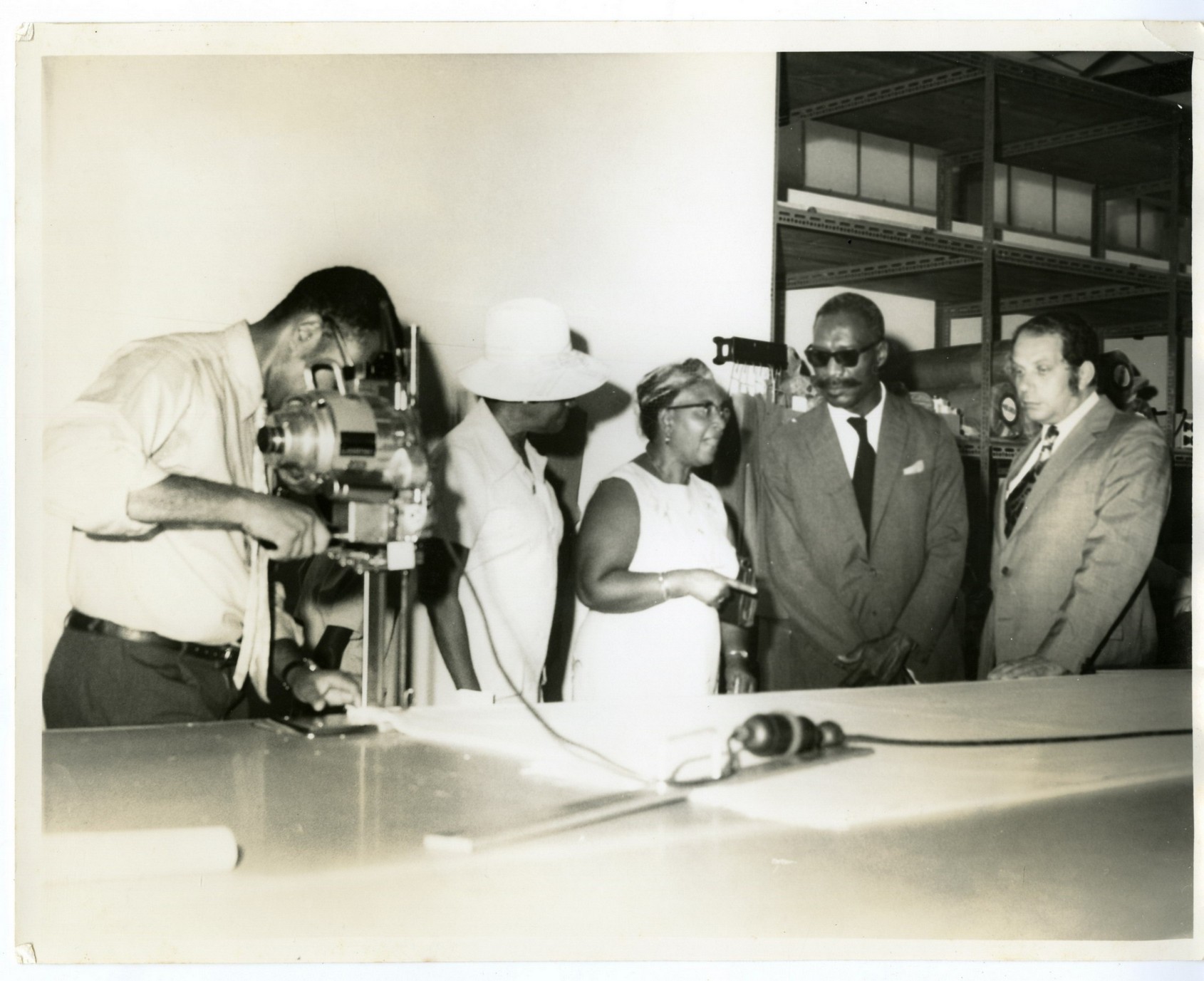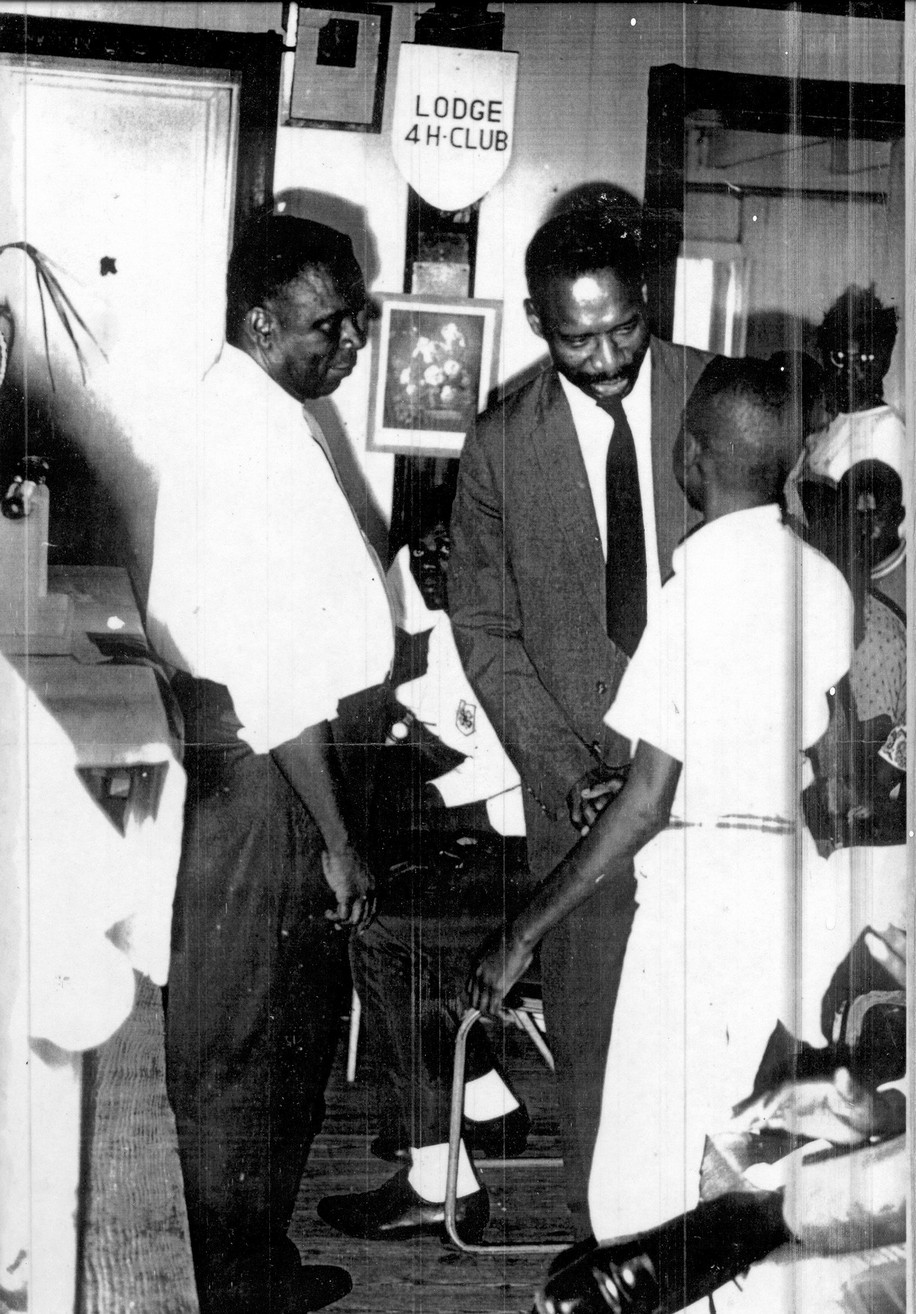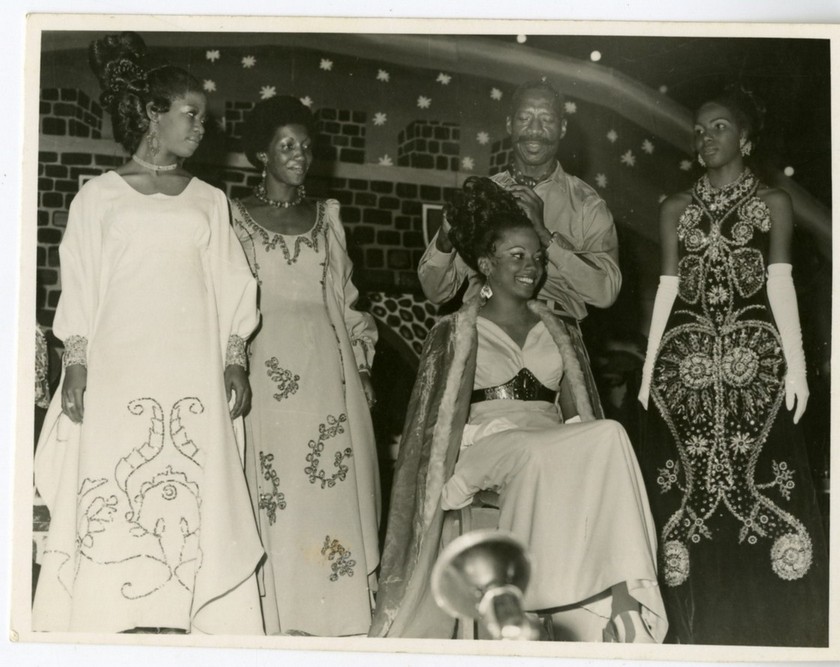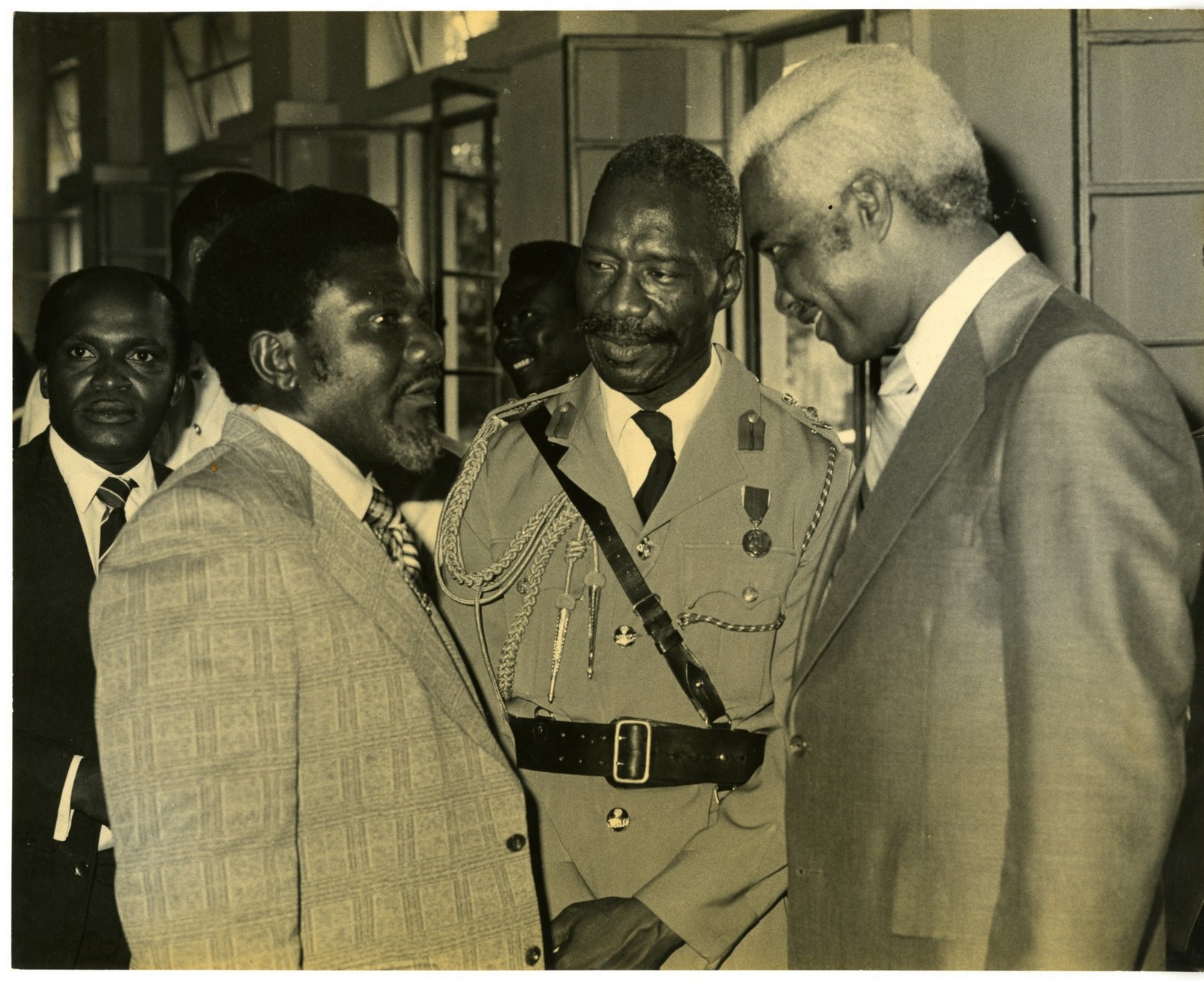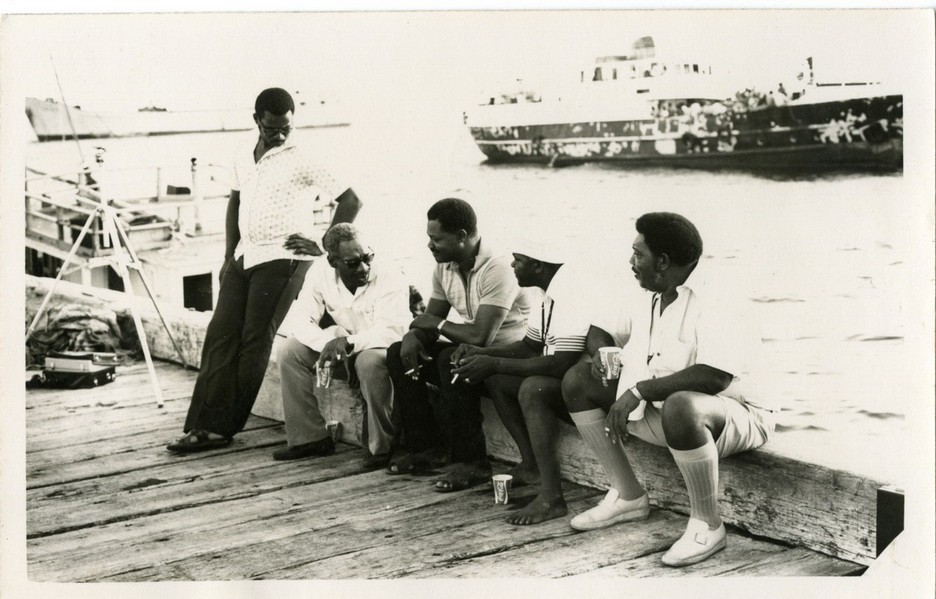Sir Joseph Nathaniel France
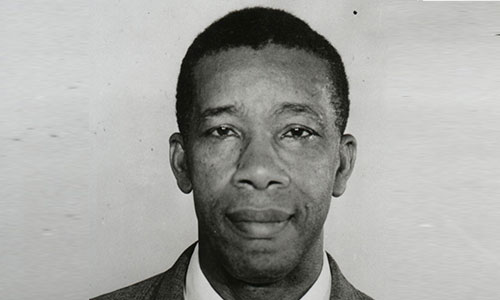
Joseph Nathaniel France was born on the 16th September 1907 to Thomas and Mary France at Mt. Lily, Nevis. Thomas who was a road driver and a small plot-holder sent his son regularly to Combermere School.
At age thirteen, young France went to St. Kitts to spend his school holidays with relatives in New Town. But before the vacation was over he was offered a job as office boy with the St. Kitts-Nevis Universal Benevolent Association at its office on Cayon Street. His parents allowed him to take the job on condition that he continued his education at evening classes in St. Kitts. This, he was able to do because the UBA ran a night school and young France attended regularly. He also supplemented his tiny income by grinding the organ at the Apollo Theatre to accompany silent films.
In 1921, the UBA started publishing the newspaper The Union Messenger under the editorial direction of J. M. Sebastian. France started his career as a printer for this newspaper and contributed to its day to day issues as a reporter, columnist, and short story writer. The paper in fact provided him with an outlet for self-expression and for putting into practice some of the things that he had learnt as a member of the Mutual Improvement Society. In its quarterly syllabus, the society included public speaking and debating, essays, appreciation of poetry, and musical evenings. On such evenings, France played the piano and sometimes the clarinet. He also played the piano at the cinema during the showing of silent movies. After Sebastian’s death in 1944, France became the editor of The Messenger until it ceased publication in the 1960s. He was also editor of the Workers’ Weekly from 1942 to 1956.
With the formation of the St. Kitts Workers’ League in 1932, France started taking an active part in labour programmes designed to make the working class aware of the need to become more organised. Public meetings. Leaflets, the distribution of British Socialist Literature and petitions to the Colonial Office were all part of the order of the day for members of the Workers’ League. As one of its directors, France found himself, along with other leaders, cast in the role of peacemaker during the Buckley Riots of 1935. Two years later, France was among those campaigning for the right to vote and then promoting the election of Challenger and Manchester to the Legislative Council. Then in 1938, he was one of the members of the League to give evidence in front of the Royal West India Commission. When during that same year, W.A.H. Seaton died, France was chosen to fill the position of secretary of the League.
The League’s activities were aimed at the improvement of conditions for workers both in and out of the workplace. The agitation for change in trade union legislation was intended to assist with the former. In 1940, following the passing of the Trade Union Act, it became possible for a trade union to operate without legal restrains. The League launched the St. Kitts-Nevis Trades and Labour Union and J.N. France became its first General Secretary. France helped to shape the union into the nineteen sections that it now has and his experience in industrial conflicts of various kinds was invaluable in negotiations and conciliation of issues with which the Union had to deal.
In 1946 France along with Robert Bradshaw and Maurice Davis was elected to the Legislature. He served as Member for Social Services from 1952, and when the ministerial system was introduced, he became Minister for Social Services. Under his portfolio fell education, health and social affairs. When in 1967, the new hospital was built at Buckley’s it was named after him, in honour of the invaluable services he rendered in this field. France successfully contested nine general elections between 1946 and 1984. He helped in the passage of such land-mark laws as those that instituted the National Provident Fund, and CEMACO and others that provided for the protection of wages for domestic servants and shop assistants, and the acquisition of the sugar lands. France was a member of the Editorial Board of The Labour Spokesman and contributed regularly to its publication. Although he did not contest the General Election of 1989, France patronage of Sam Condor ensured an easy transition from one Labour candidate to another. Joseph Nathaniel France continued to occupy the position of General Secretary of the Union until his death on the 21 st Mat 1997.
Maurice Herbert Davis
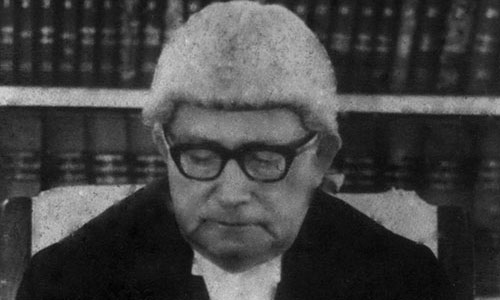
Maurice Herbert Davis was born on the 30th April 1911 to Louisa Richards of Old Road. His father was Claude Mortimer Davis, an engineer. As a boy he attended the Basseterre Boys’ School and graduated with a Seventh Standard Certificate. At the age of fifteen he started serving as a pupil teacher at Trinity Government School. Later he became a junior civil servant and worked in the Court Registry where he first made acquaintance with a career in which he was to enjoy admirable success. During the 1937 elections, the first in sixty years, Davis assisted E. A. Evelyn, the Returning Officer in Basseterre and was actually the first person to vote in that constituency.
In 1941 Davis went to England to study law. He was admitted as a student by the Honourable Society of the Inner Temple in London. In the space of eighteen months he passed his Bar finals examinations and was called to the English Bar. He returned to the Caribbean in 1943 and was called to the Bar in Antigua, then the seat of the Presidency of the Leeward Islands which included St. Kitts Nevis and Anguilla. It was also during that same year that he married Sylvia Kathleen Kelsick
On his return, Davis quickly became one of the leading lawyers of St. Kitts, Nevis and Anguilla. He excelled in the practice of criminal law but his clients came from all walks of life. His work in court was described as a magnificent performance and observers noted his incisive cutting approach to his cases, his devastating cross-examination, and his hypnotic effect on juries. Davis could suggest credible scenarios that, at times won him cases. Such was his defence of “Mango Jean” who was charged with the murder of “Tourist”. Popular belief said that “Tourist” had been sunk with ballast to the bottom of the sea but the body had not been recovered. Davis set before the jury the possibility that one day “Tourist” might reappear but by then his client would have been executed. “Mango Jean” was acquitted.
There were days however when Davis’ flamboyance did not work. In 1960 he represented nine men from St. Paul’s who worked on Belmont estate and who were accused of throwing missiles at Barbadian workers. He withdrew from this case because the Barbadian Magistrate would not dismiss himself from it and he felt his clients were not going to be fairly treated. The matter was adjourned on that occasion. When it came up again before the same Magistrate, Davis showed up late and declared that he was still on the case. The Magistrate, who had already started to hear the witnesses, reminded him of his earlier withdrawal and Davis could do nothing but withdraw a second time. Eight of the nine men were found guilty.
In 1944, following the death of Joseph Matthew Sebastian, Maurice Davis served as an elected member of the Legislative Council, representing the St. Kitts Workers’ League. He was also a member of the Federal Legislative Council. Together with Joseph France and Robert Bradshaw, he had to function within the limitations imposed on the elected members by the Committee System. At the time, elected members chaired advisory committees composed mainly of English heads of departments. The elected members found that their autonomy and influence was severely limited. As a compromise, Governor Blackburne recommended the introduction of the quasi-ministerial Membership System in St. Kitts, Nevis and Anguilla. Davis served as the Member for Communications and Works. Meanwhile relations with the other representatives of the League started to deteriorate .
In 1954 the Colonial Office expressed concern that the men who were likely to serve as Ministers were also Union leaders and wanted them to chose which role they would perform. Governor Blackburne feared that the employers and intelligentsia would “try to drive a wedge between parties and unions” in the islands throwing society back into industrial anarchy. It was Davis who argued that the electorate had returned Union leaders in the 1952 election and that the electorate should decide the matter again in the following election..
During this period, Davis was appointed in turn legal advisor and chairperson of the Central Housing Corporation which was then engaged in the eradication of trash houses and slums in St. Kitts. It was also during this period that Davis, who formed part of a legal team lead by Sir Courtenay Hannays, represented the Government in the case concerning the acquisition of Frigate Bay. He also served as a member of the Law Library Committee, the Labour Welfare Fund Committee and represented St. Kitts in the discussions that were taking place in London concerning a federation of the West Indies.
The issue of a new sugar factory in Nevis widened the breach in relations between Davis and Bradshaw. The project had been deemed uneconomic in a study conducted by the Colonial Office. Davis was uncompromising in his objection too it. The majority of the Executive Council including the member for Nevis advised against it. Bradshaw was the only dissenting vote.. On the 1st May 1955, the first Labour Day celebrated in St. Kitts Bradshaw openly attacked Davis. At a legislative council meeting he later called for an inquiry into the operations of public works which resulted in his replacement by Southwell. This change marked the final break between the coloured middle class, which had launched the movement, and the new leadership of the League.
The full Ministerial System of Government was introduced in 1956, and France, Bradshaw and Southwell were the first ministers. By the following year Maurice Davis had disappeared from the labour platform. His co-operation with Labour came to an end when he found himself disagreeing strongly with the Party’s policies. A clash of personalities and questions about the intellectual capabilities of the other labour candidates seem to have played a role in Davis decision to change political allegiances. Lee Moore was later to describe him as “an aristocratic democrat or a democratic aristocrat”. Educated and outspoken Davis, often found it difficult to toe the line within the party.
In 1960 he faced the electorate as the leader of the People’s Progressive Movement. He was joined by other disappointed Labour supporters such as Guston Lewis and Edrick Liburd. From that platform, Davis claimed that he had run for election in 1944 because, at the time, nobody else would. He also criticised the “fanfare and trumpet blowing” over the acquisition of Frigate Bay by the Government. He pointed out that the earlier acquisition of Bayfords had also been accompanied by promises and hopes that had not materialised because of lack of proper planning. Planning for the future became the theme of his campaign.
The PPM was not the only party opposing Labour. The Democratic Party, later the People’s Action Movement, strongly supported by the planter class was gradually gaining momentum. However, unlike some of the others who had joined him in the PPM, Davis did not allow his disagreements with the Labour Party to push him into the fold of PAM. Before long he was again working with the Labour Government. In 1970, he was asked to chair the committee for the Christena Disaster Fund.
In 1975, Maurice Davis was appointed Chief Justice in the Eastern Caribbean Supreme Court. His candidature was championed by Premier Robert Bradshaw and received the consent of all the premiers in the Associated States. Her Majesty conferred on him the title of Knight Batchelor. During his first meeting with his judicial brothers of the Court of Appeal, Sir Maurice announced that his sign was Taurus and that they should govern themselves accordingly. In the court room, his judgements were characterised by brevity and simplicity. Within the fraternity, he made the salary and conditions of employment of judges a cause and he campaigned and obtained improvements in their favour.
When on the 21st April 1975, he came to St. Kitts in his new capacity, it was to hear the appeal by the Government against the Judgement in the Sugar Land Acquisition Case of the previous year. His decision favoured the Government and the owners opted to take the matter to the Privy Council.
In 1983, following his retirement from the Bench, Sir Maurice accepted the Labour Party’s invitation to serve on the Electoral Commission. He later tendered his resignation, claiming with total frankness and to the disappointment of the party that had nominated him, that his membership was, to him, a waste of time.
Sir Maurice died on 23rd October 1988 following a prolonged illness. He was survived by his wife, the Lady Kathleen, their son and five daughter and their families.
Sir Robert Llewelyn Bradshaw
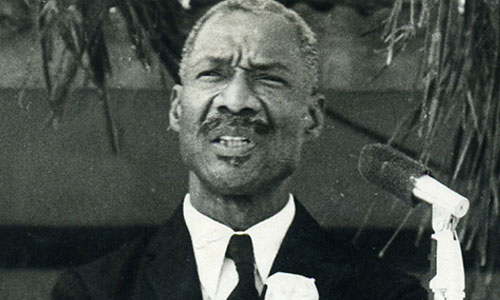
Robert Llewellyn Bradshaw was born on the 16th September 1916 in St. Paul’s Village, St. Kitts. His mother, Mary Jane Francis was a twenty-year-old domestic servant, his father William Bradshaw was a blacksmith who migrated to the US when his son was only nine months old. Young Robert, who was described by some as a dull and reticent youth, was brought up by his grandmother who ensured that he behaved himself and went to school. The family was far from being wealthy, there was no luxury but food was plentiful and fresh.
Robert’s grandmother was responsible for his discovery of something called the Union (the popular name of The St. Kitts Benevolent Association). Every morning before going to school, she took him with her to Belmont Estate where she worked to help her weed cane. On Mondays she would give him a penny or three penny bit as her Union dues. This, the boy had to give to Gabriel Douglas, the local Union representative who lived just at the entrance to the school.
By age 16, Robert had earned three Seven Standard Certificates, the highest education attainment in the primary schools of the period. He had even taught as a pupil teacher for a short while before he went to Basseterre where he became a machine apprentice at The St. Kitts (Basseterre) Sugar Factory, the most prestigious employer in the Presidency. His mother was then caretaker of the guest house at the Factory and young Robert moved in with her and got a glimpse of life at the managerial level. He could not help but compare the way of life of the white managers at the factory to that of the black workers in the village where he grew up. The disparity troubled him greatly. When one day he accidentally discovered a torn document showing the profits made by the factory he realised the extent of exploitation that was taking place.
In the machine shop, Adam Claxton, a welder, suggested that Bradshaw should join the Workers’ League. His membership was seconded by Harry Audain. However his career as a machinist did not have a chance to take off when in an accident in the machine shop Bradshaw injured his right hand and the doctors were unable to restore its full use. Bradshaw stayed in the tool room of the machine shop where he earned two shillings and three pence (54c) per day but he also turned his attention to more academic pursuits. His mother paid for a correspondence course with the Regent Institute in England and two boys from the St. Kitts-Nevis Grammar School who worked in the Factory Laboratory helped him with his studies. Later, Charles Halbert, the owner of a bookshop in Basseterre and a strong advocate of black pride and self-sufficiency became his friend and confidant and helped to inspire and mold his political ideas.
1940 marked a turning point in Bradshaw’s involvement in the union. A strike for higher wages cost him his job at the Factory and he was taken on at the newly formed St. Kitts Nevis Trades and Labour Union as a clerk. Bradshaw also became the first secretary of the Sugar Factory Section of the Union and a member of the Executive Committee. In 1944, following Sebastian’s death, Bradshaw became Union President and vice-president of the Workers’ League and four years later lead the Union through the throes of the Thirteen Week Strike. The scope of labour activity had broadened as it was recognised that wages were not the only problem facing the workers of St. Kitts and change had to involve every aspect of life if the situation was to improve. Among the achievements of the period was the fact that workers could no longer be arbitrarily charged for not reporting for work.
The 1948 strike sparked off the Soulbury Commission of Inquiry into the organization of the sugar industry and the Labour Leader was appointed to it. Throughout the hearings, Bradshaw noticed that the planters and factory management had the ears of the Commission but the workers were not given a fair hearing. Dissatisfied with the totality of the Commission’s conclusions, Bradshaw wrote a minority segment which was included in the report. He even went to England in an effort to bring this bias to the attention of the Colonial Office. The prolonged nature of the strike drove the more conservative middle class into an alliance with the planter class. This took the shape of the Democratic Party launched by the end of that year.
Bradshaw’s activities were not limited to the local scene. In 1945 he took part in the establishment of the Caribbean Congress of Labour and was elected its first assistant secretary. In 1947 he represented St. Kitts-Nevis-Anguilla at the “Closer Union” Conference for the amalgamation of the Windward and Leeward Islands and at the Montego Bay Conference which discussed the Federation of the West Indies. Two years later he participated in the establishment of the International Confederation of Free Trade Unions in Brussels and was elected to its first Executive Committee.
This was the period when in control of the Union’s activities, Bradshaw thought it offensive that a racist South Africa would be permitted to export its products unhindered to St. Kitts and Nevis. As a result he spearheaded a boycott of produce from the Union of South Africa. Especially hard hit was the wines then the principal product imported. This bold move, was followed by action in the Legislative Council which effectively barred the recruitment for service of prospective employees hailing from South Africa.
Operation Blackburne found Bradshaw on the streets of Basseterre leading a huge demonstration. It was an effort on the part of the Labour Movement to draw attention to its claim that the Colonial Office should consult the representatives of the people before the appointment of Governors and Administrators for the Caribbean colonies.
In the political arena, Bradshaw was elected along with J.N. France and M. Davis to the island’s Legislative Council in 1946 and later became a member of the Leeward Islands General Legislative Council. He was again elected in 1952 when universal suffrage was introduced. Four years later when a ministerial system came into effect, Bradshaw was appointed Minister of Trade and Production after having seen service in the precursor training period known as the membership system. It was during this period that a rift developed between himself and Maurice Davis and R.J. Gordon of Nevis. It represented a much deeper growing hostility between the Labour movement on one hand and the middle class and the people of Nevis on the other.
In 1958 Bradshaw was elected to the Federal Parliament and held the position of Minister of Finance. When the Federation was dissolved in 1962, Bradshaw felt that “we were ruining the one great opportunity we had of making ourselves a recognizable grouping on a national scale in the world.... the populations had given their leaders a mandate to form a Federation and bring it to Nationhood. The fact that we did not do so meant that we failed the people.” It was with a sense of weariness that he greeted the next attempt at regional integration as it took shape in the form of CARIFTA and later CARICOM. His commitment to the concept had not faltered but a sense of skepticism over how far it would go this time invaded some of his public speeches.
After the dissolution of the West Indies Federation, Bradshaw returned to St. Kitts and re-occupied a place in the local legislature. Milton Pentonville Allen, a local stalwart, who was later elevated to the status of Governor of the State, relinquished his seat in the Legislature allowing the returning Bradshaw to win the by-election by a landslide. After the elections of 1966, Robert Bradshaw was sworn in as Chief Minister and on the 27th February 1967 he became the first Premier of the Associated State of St. Kitts-Nevis-Anguilla.
The granting of Statehood opened the door to secession. Bradshaw had never quite reconciled the economic differences in systems of production of the three islands. St. Kitts was the only one of the three that had a largely landless labour force dependent on sugar earnings. It became the power base of the Labour Movement. However Nevisians and Anguillans were mostly self-employed giving rise to a totally different point of view in economic, social and political development. Those that made the move to St. Kitts often found that the policies advocated by the Labour Movement worked to their benefit but the ones that stayed behind did not share the experience.
Anguilla opted for secession immediately and with the active encouragement of the People’s Action Movement and the procurement of financing from interested foreigners, agitation progressed leading inevitably to British Government intervention. Bradshaw, who had watched with anguish only a few years previously the disintegration of the West Indies Federation was being called upon to dismember his own tiny state into its separate components. He refused to allow secession on the grounds that the constitution stipulated that any such move must be initiated by the Legislature of the Associated State. He felt compelled to stop such disintegration and perhaps driven by this obsession his methods lacked a sound legal foundation. Such was the case on the issue of detention of suspects, a matter that brought him in conflict with the Governor, himself a constitutional lawyer. Sir Fred Phillip advised that charges be brought immediately and that these be as specific as possible so that a detainee could rebut them without difficulty to avoid challenges in court. However in this instance emotions were running strong and Bradshaw chose to ignore the advice of the Governor and lost the case.
In the end, the metropolitan government achieved secession for Anguilla by the enactment of an Order-in-Council. Nevis lingered on, threatening to secede at any time but the Premier remained committed to a unitary state and a West Indian Federation. This however did not distract Bradshaw from seeking Independence.
Outside of politics, Bradshaw had a flare for fine living. This was demonstrated in his an interest in antiques which he avidly collected on his trips abroad often to the consternation of those who accompanied him and knew nothing of the value of the items he purchased in markets of England and elsewhere. He also had a taste for good cigars and fine wines. On a more aristocratic level he showed a great deal on interest in Heraldry. When the Coat of Arms for the new Associated State was required he critically and authoritatively examined all submissions then presented the Executive council with a design that was considered “original and appropriate.”
Throughout his career, Bradshaw maintained a great interest in the Sugar industry in St. Kitts. Its survival and the welfare of the workers that depended on it were of great concern to him both as a political and as a trade union leader. With the acceptance of Ministerial powers came the responsibility for a viable economy. In the mid-1960s came a decline in sugar production and international sugar prices. Bradshaw embarked on a two-pronged solution - the rescue of the industry and diversification of the economy. Sugar could not be abandoned as seventy per cent of government’s revenue was generated by it and the employment of many Kittitians who were the basis of the political strength of the Labour Movement was dependent on it. However rescue operations were being thwarted by the indiscriminate sale of sugar lands and the inability of the planters to effectively put in place the measures required for the survival of the industry. So in 1975 Bradshaw took the bold step of acquiring the sugar lands and then the sugar factory. To many planters the move came as a relief but then within a very short space of time their monetary expectation in the way of payment multiplied to a sum far in excess of what Bradshaw was prepared to offer. Whilst the land stayed under cane, the matter of payment became the subject of a legal battle that was not resolved till much later.
In 1975 the Labour Party had two main issues to put before the electorate: “that the sugar lands should irrevocably remain the property of the State and that rapid progress towards independent status within the Commonwealth” be sought. All the while following Statehood, Bradshaw and his administration set about putting in place the machinery that would give the future micro-state a chance to survive. Dramatic changes took place in education, tourism, Social security, and the infrastructure.
By the time Independence talks commenced in earnest in 1977, the foundation of the new state had been placed on sound footings. But by then, the Premier was a very sick man. He underwent major surgery in St. Kitts in 1976 and had to undergo another major operation in London in January 1978. He died on the 23rd May of that year surrounded by family and friends at his home in Fortlands, Basseterre.
Commenting on his legacy, The London Times said, “he has left behind him in St. Kitts a solid structure of social services and amenities considering the slight resources of his State.” Sir Fred Phillip who had to deal with him during the Anguilla crisis said, “For all his faults,, he was a man of high principles and had the courage of his own convictions.” Robert Bradshaw stood out as a forceful leader, a skillful politician and an important catalyst for real changes in St. Kitts and in the broader Caribbean. On the 16th September 1998, he was posthumously given the title of Knight Commander of the Order of The National Hero.
Charles Ashton Halbert
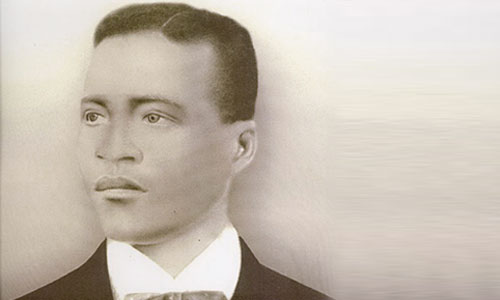
Charles Ashton Halbert born in Bath Village, Nevis on the 25th April 1880. His mother worked as a nurse for the Parmenter family. At the end of his schooling young Charles earned his Seven Standard Certificate and became a pupil teacher.
In 1896, at the age of sixteen he found employment as a store boy at the Charlestown branch of the S.L. Horsford. In 1900 when the business of the branch was acquired by R.B. Parmenter, young Halbert was sent to work at the Dieppe Bay branch as a clerical assistant. At that time Dieppe Bay was one of the shipping ports on St. Kitts. A year later, Halbert was promoted to the position of clerk-in-charge. In 1904, he decided to try his fortune in the Dominican Republic, returning to Nevis in 1911 and again worked for shipping agents first in Nevis then in St. Kitts.
With the money he had been able to save in Santo Domingo he set up his own business selling cards and stationery. His wife managed the shop while he worked. In 1915, when he moved to St. Kitts, Halbert moved his business too. He established the Halbert Bookshop and Circulating Library at a premises on the south west corner of Fort and Central Street. During the 1920s the bookshop became a source of trade union and socialist literature for which the demand was growing on the island. He stocked material from the Thinker’s Library and the Fabian Society in England, works on Black History and publications by Black authors and poets. His shop was the only public place in which hung portraits of Marcus Garvey and Haile Selassie. In the 1930s he bought a property on Main Street, Charlestown where he established a similar enterprise in Nevis. The sale of war pictures and reading material about the war in Europe attracted large numbers of visitors to his shops. Part of the profit from the sale of such items was contributed to the local unit of the “War Effort”.
Well-read and knowledgeable on many topics, Halbert was not satisfied with the mere sale of books. His interest lay in spreading the knowledge contained in them. He encouraged people to visit his bookshop read, study and discuss the issues of the day. Among the persons in whom he recognised great potential was Robert L. Bradshaw. He became Bradshaw’s mentor and provided him with literature whenever possible. From time to time Halbert would take a newly arrived book, remove the outer jacket, cover it in brown paper then send it to Bradshaw with a message that he should read it and return it by the following day as the book had to be made available for sale. He knew that the young leader did not always have the money to buy books, and yet he felt that he had to ensure that Bradshaw had an understanding of his history and people and a sense of pride in his identity as a black man. At a time when the Public Libraries would only issue books to adults, Halbert made sure that promising youngsters had a chance to experience the thrill of discovery through reading and at times even allowed them to take books home.
The People’s Reading Room opened in Charlestown in 1943. On opening day there were two large tables covered with a variety of literary matter, periodicals, newspapers, pamphlets and tracts and a shelf unit containing encyclopedias as well as books on social, industrial, economic and religious questions. Charles Halbert had provided an opportunity for “social improvement for the community” in the hope that people of all classes would, in their spare time, take advantage of the facility.
In the field of education, Halbert encouraged achievement by donating reading material, school prizes and by promoting scholarships. To the best boy in Standards three and seven at the Charlestown Boys School, Halbert donated a prize of 10 shillings. One of the recipients, remembers that the money was used to purchase a pig, two sheep and a goat. Pupil teachers were then paid 5 shillings a month. Similar prizes were offered to the Charlestown Girls School.
Meanwhile the need for far-reaching reform lead, in 1932, to the founding of the Workers’ League in which Halbert took an active part. He was also very much involved in organizing the St. Kitts-Nevis Trades and Labour Union in 1940. He was prominent in recruiting waterfront workers who often knew him personally through his close association with them as a clerk for the shipping agents at the Government Warehouse in Basseterre. This was a post he held until 1940 when his services were terminated under pressure from the shipping agents because of his activities in support of the factory workers’ strike of the same year. During the strike, Halbert had been instrumental in opening a food distribution centre in Irish Town to assist the workmen and their families in the crisis. In later years, because of his devoted service to the Labour Movement, Halbert was recognised as the “Father of Labour”.
Halbert’s hard work and careful use of money allowed him to acquire property and live comfortably in his own house and send his son to Grammar School. His social standing and civic commitment brought with them service on a number of committees, including the Warner Park Committee where he was secretary.
In later years he contributed articles to The Labour Spokesman designed to educate readers in the history of the Labour Movement locally and internationally and to raise awareness in the responsibilities of enfranchisement and governance. Charles Halbert died on the 31st January 1971. He was survived by his wife Helena and his son Cyril.
National Archives
Government Headquarters
Church Street
Basseterre
St. Kitts, West Indies
Tel: 869-467-1422 | 869-467-1208
Email: NationalArchives@gov.kn
Website: www.nationalarchives.gov.kn
Follow Us on Instagram

